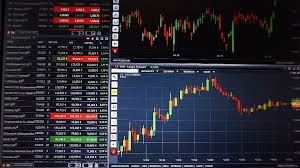Mastering Online Forex Trading Strategies and Insights 1818421094
posted Eki 29 2025

Mastering Online Forex Trading: Strategies and Insights
Online forex trading has transformed the landscape of global finance, providing traders with opportunities that were once limited to institutional investors. With the right strategies and knowledge, anyone can dive into the dynamic world of currency trading. Whether you’re a novice looking to understand the basics or an experienced trader seeking advanced tactics, this guide will equip you with essential insights for success. To start your journey effectively, consider exploring options through online forex trading South Africa Brokers, which can provide valuable resources tailored to your needs.
The Basics of Online Forex Trading
Forex, or foreign exchange, refers to the global marketplace for trading national currencies against one another. Unlike other financial markets, the forex market operates 24 hours a day, five days a week, allowing traders to engage in trades at virtually any time. Trading pairs, such as EUR/USD or GBP/JPY, reflect the value of one currency in relation to another. Understanding how these pairs work is the foundation of successful forex trading.
Choosing the Right Broker
Your choice of broker can significantly impact your trading success. Factors to consider include regulation, trading platforms, fees, customer service, and available currency pairs. Ensure that your broker is regulated by a reputable authority to safeguard your investment. Additionally, assess the trading platforms they offer—some traders prefer platforms with advanced charting tools while others may favor user-friendly interfaces.
Understanding Leverage and Margin
Leverage is a powerful tool in forex trading, allowing traders to control larger positions with a smaller amount of capital. For example, with a leverage ratio of 100:1, you can control a $100,000 position with just $1,000. While leverage can amplify profits, it also increases risk. It’s crucial to understand margin requirements and manage your risks effectively to avoid potential losses.

Developing a Trading Strategy
A well-defined trading strategy is vital for navigating the forex market successfully. Common strategies include:
- Scalping: This involves making many small trades throughout the day to capitalize on minor price movements.
- Day Trading: Day traders open and close their positions within the same trading day, aiming to profit from short-term price fluctuations.
- Swing Trading: This long-term approach involves holding positions for several days or weeks, aiming to capture larger price swings.
- Position Trading: This is a longer-term strategy where traders hold positions for months or years, targeting significant market trends.
When developing your strategy, define your risk tolerance, set clear entry and exit points, and maintain a disciplined approach to trading.
Risk Management Techniques
Effective risk management is key to surviving and thriving in forex trading. Here are several techniques to implement:
- Set Stop-Loss Orders: Establish stop-loss orders to automatically close your positions at predetermined price levels to limit your losses.
- Use Take-Profit Levels: Similar to stop-loss orders, take-profit orders help you secure profits by closing a position once it reaches a specific level.
- Diversify Your Portfolio: Don’t put all your capital into one trade; diversify across different currency pairs to spread risk.
- Position Sizing: Determine the appropriate size for each trade based on your account balance and risk tolerance to minimize potential losses.
Utilizing Technical and Fundamental Analysis

To make informed trading decisions, it’s essential to understand both technical and fundamental analysis:
- Technical Analysis: This involves studying historical price charts, patterns, and indicators, such as moving averages and relative strength index (RSI), to predict future price movements.
- Fundamental Analysis: This focuses on economic indicators, news releases, and geopolitical events that can impact currency values, such as interest rate changes or unemployment reports.
Many successful traders combine both approaches for a comprehensive market view.
Staying Updated with Market News
In the fast-paced world of forex trading, being informed is crucial. Regularly update yourself with market news and economic calendars to understand potential market-moving events. Many online platforms provide news feeds and analysis that can help in making timely decisions.
The Role of Emotions in Trading
Emotions can play a significant role in trading outcomes. Fear and greed often cloud judgment, leading to irrational decisions. Developing emotional discipline is crucial for long-term success in forex trading. Stick to your trading plan, avoid impulsive trades, and be prepared to accept losses as a part of the trading journey.
Conclusion
Online forex trading offers exciting opportunities for profit, but it requires education, practice, and a well-thought-out strategy. By selecting the right broker, understanding market dynamics, applying risk management techniques, and staying informed, you can enhance your trading skills. Remember that successful trading is a journey, not a destination—continue to learn and adapt to the ever-changing market landscape. Whether you’re trading from South Africa or anywhere else in the world, the forex market holds the potential to transform your financial future.



